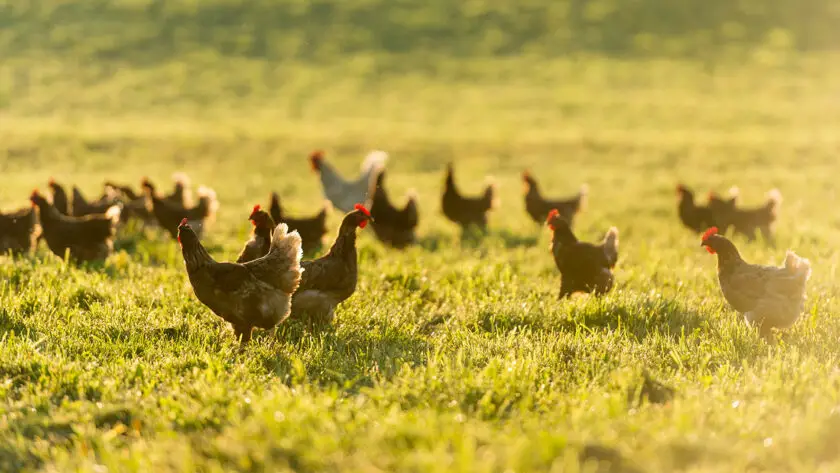When it comes to eggs, the market shelves are filled with terms like “cage-free” and “free-range.” But the term “pasture raised chicken eggs” is relatively new, so it can be confusing on the quality of eggs your getting, and how the chickens are being raised and fed. Do you grab the least expensive option, or maybe the carton with the most visual appeal? No matter your motives, a little understanding can go a long way when it comes to choosing the carton of eggs that’s right for you.
Outside of “Certified Organic” and “Certified Humane”, the U.S. government does not set definitions or requirements for egg carton labels.
Pasture Raised Chicken Eggs
We as consumers are becoming increasingly skeptical of ‘marketing terms’ that bear little relation to the realities of how the eggs are farmed, and rightly so. Here is a breakdown of what these marketing terms actually mean.
- Natural: This label has no definition or association with the welfare of the animal. In short, all eggs are natural.
- Caged: Hens are confined to cages with a 67-square inch space each. They never see the light of day and consume a corn or soy diet that is typically sprayed with pesticides. More than 90 percent of eggs in the U.S. come from hens that are kept in cages for their entire egg-laying lives.
- Cage-Free: These ladies have more room than caged hens, since each is given less than 1 square foot. Still, they are confined to barns with 0 access to sunlight and consume a corn or soy diet.
- Free-Range: Allotted less than 2 square feet per hen, these animals have more space than caged and cage-free, but they don’t get outdoors as much as you may think. There are no requirements or audits in place to guarantee the number of birds housed, outdoor access or feed. Some seldom get to see the light of day and many eat a corn- or soy-based feed.
- Omega-3 enriched: While this label has no association with the welfare of the animal, it often means that the bird’s feed is fortified with small amounts of flax or other omega-3-rich food sources. This increases the amount of omega-3 fatty acids found in the egg itself.
- Vegetarian-fed: First and foremost, it’s important to note that hens are omnivores, so the demand for hens to be fed a vegetarian diet is a bit nonsensical. The diet also does not in any way impact the welfare of the animal. Vegetarian-fed hens are often fed a grain-based diet with supplemental, artificial amino acids.
- Certified organic: While the term organic may imply health, what it really means in the context of eggs is that the hens are cage-free and required to have access to the outdoors. They are fed an all-organic diet free of antibiotics. Forced molting, or the loss of feathers, through starvation – which is done to manipulate the egg-laying cycle – is permitted. Yikes.
- Certified humane: Similar to “cage-free,” these birds are un-caged but may be kept indoors at all times. The term “certified humane” is subjective, though there are third-party organizations that audit compliance. Hens often have enough room to perform natural behaviors like nesting, perching and dust-bathing, and there are requirements in place to prevent overcrowding. Forced molting through starvation is prohibited.
- Pastured eggs: When you consider the idea of replicating a chicken’s natural environment, pasture-raised birds are the gold standard. The birds spend the majority of their lives outdoors, though the amount and quality of the space can vary from farm to farm. There is indoor shelter available as well. The chickens are able to eat a more natural diet of grass, worms and insects, though this is often supplemented with grains, both organic and conventional, depending on the farm. A newer term cropping up on shelves, “alfresco,” denotes eggs that come from pasture-raised chickens that are fed a conventional diet.
Pastured-raised hens also produce healthier eggs, according to a 2003 study out of Pennsylvania State University. In it, researchers found that one pasture-raised egg contains twice as much omega-3 fat, three times more vitamin D, four times more vitamin E and seven times more beta-carotene than eggs from hens raised on traditional feed. Vitamin A levels were also boosted a whopping 40% in the yolks of pasture-fed birds than in the caged birds.
From an agricultural standpoint, pasture-raised eggs are often superior too. When hens graze, manage their own feed and spread their own manure, farmers have less work and need less equipment.
It is believed that pasture-raised eggs are insanely expensive, and they may be at the grocery store, but that seems to be the case for most eggs now. Buying from a local egg supplier, like the farmer who lives down the road, or your local farmers market is typically the cheapest and most humane option. Looking online in local social media groups, or local farmers market directories will help you find your closest local chicken farmer. Eggs are a great source of protein and contain many specific nutrients worthy of gracing your plate.
Recommended Reading:
“Fit Grandma” Says Eating 150 Eggs a Month is Her Secret to Staying Healthy







